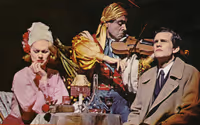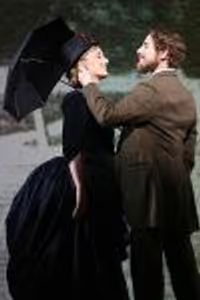Award Winning Playwright Almost Slaps a Theatre Patron (and what that apparently says about our theatre)
#2Award Winning Playwright Almost Slaps a Theatre Patron (and what that apparently says about our theatre)
Posted: 12/9/15 at 7:30pm
I'm going to get chastised beyond belief for this, but I think it's going overboard to say that theatre has "a white privilege and elitism problem." Everything these days is supremacist and elitist and sexist and misogynistic and transphobic and ableist and xenophobic, so really, nobody should do anything anymore. Nothing is ever good.
Updated On: 12/9/15 at 07:30 PM#3Award Winning Playwright Almost Slaps a Theatre Patron (and what that apparently says about our theatre)
Posted: 12/9/15 at 7:32pm
The author of that article clearly has a huge chip on her shoulder and she comes across like a complete ass.
#4Award Winning Playwright Almost Slaps a Theatre Patron (and what that apparently says about our theatre)
Posted: 12/9/15 at 7:52pm
BroadwayConcierge said: "I'm going to get chastised beyond belief for this, but I think it's going overboard to say that theatre has "a white privilege and elitism problem." Everything these days is supremacist and elitist and sexist and misogynistic and transphobic and ableist and xenophobic, so really, nobody should do anything anymore. Nothing is ever good.
"
No, I'm with you (as seem to be most of the comments on the site.) It doesn't help that she drops the fact that she's a prize winning playwright whenever she can. The "old white woman" seemed a bit grumpy, but really... She gave her a *free* ticket (the playwright didn't need her charity but since she says she had no money, maybe she kinda did?) The woman was clearly racist despite her black husband (who I assume the implication is this harpy had him firmly under her thumb). She told her to be quiet essentially but this Award Winning Playwright says one should be allowed to enjoy a show however they want the way she is in her church... And then this horrible woman tried to leave when the award winning playwright tried to "educate" her after the show, so she wanted to and almost slapped her.
Ummm..
#5Award Winning Playwright Almost Slaps a Theatre Patron (and what that apparently says about our theatre)
Posted: 12/9/15 at 8:02pm
I think the author is acting way more elitist than the audience member who wanted it quiet. They both wanted to enjoy the theatre their own way. BOTH of them, not just one of them, are forgetting that audiences are made up of different types of people with different ways of experiencing art. (This is not the same thing as someone on their cell phone, just distracting and not paying attention, since both of these people were paying attention.)
Tolerance is what is missing here, on BOTH sides.
This playwright is too self-absorbed to see that.
blocked: logan2, Diamonds3, Hamilton22
#6Award Winning Playwright Almost Slaps a Theatre Patron (and what that apparently says about our theatre)
Posted: 12/9/15 at 8:08pm
Miss Thing rides a very high horse, don't you think?
I am well aware of the African and African-American traditions of audience participation during theatrical (and religious) events. But outside musical comedy and some avant grade forms such as Happenings, such has not been the tradition in European theaters for several centuries.
Neither tradition is inherently better or worse than the other and a well-directed production should cue the audience as to which sort of behavior is appropriate in that particular production. The op ed writer might have used the performance in question as a "teachable moment" for the lady who was kind enough to give her the tickets; but instead she jumped to knee-jerk rhetoric about white privilege--even to the point of implying that violence would be an appropriate response.
So let me ask this: when the playwright participates vocally as an audience member, is she asserting black privilege?
VintageSnarker
Broadway Legend Joined: 1/30/15
#7Award Winning Playwright Almost Slaps a Theatre Patron (and what that apparently says about our theatre)
Posted: 12/9/15 at 8:10pm
The gum-popping was weirdly specific but I don't think Jane was rude to ask for her to be a little quieter in her enjoyment. People have different tastes in how they like to experience theatre. I am personally very quiet and will not speak up unless someone is being ridiculous (like using their cellphone) but I will seethe inside and find it distracting. Everything is not because of racism.
"When the show was over, I tried to engage Jane in conversation around the topic of entitlement in the theatre, but she wasn’t interested."
Also, given the way the author wrote this piece, this was a SHOCKER.
#8Award Winning Playwright Almost Slaps a Theatre Patron (and what that apparently says about our theatre)
Posted: 12/9/15 at 8:13pm
I'm not going to pick a side on this one given that I wasn't there and this is only one side of the story; however, this woman's writing is dripping with entitlement and an air of superiority. She writes as if she is beyond reprieve. If she couldn't afford the tickets the box office had to offer, why didn't she just leave? She said she didn't need charity yet waited around off to the side for charity.
#9Award Winning Playwright Almost Slaps a Theatre Patron (and what that apparently says about our theatre)
Posted: 12/9/15 at 8:23pm
It's true, Cupid, the op ed writer never seems aware that she was essentially Jane's guest for the evening. One would think that might influence the writer's attitude.
#10Award Winning Playwright Almost Slaps a Theatre Patron (and what that apparently says about our theatre)
Posted: 12/9/15 at 10:15pm
I just find it bizarre, the whole setup. She was there with a bunch of friends but lacked a ticket? Her lack of ability to actually pay for the show might have led to bad assumptions far more than her skin color.
I actually think SHE was the one demonstrating the elitism here. The theatre does have a bit of an elitism problem (in my opinion) but it's not exclusively white, or +60 as shown here.
#11Award Winning Playwright Almost Slaps a Theatre Patron (and what that apparently says about our theatre)
Posted: 12/9/15 at 10:31pm
My favorite part was when she advertised her husband's music in her article.
But yeah, she comes across as an extremely aggressive patron. If she was being loud and disrupting someone else WHO ACTUALLY PAID FOR THE TICKET'S enjoyment then she should absolute shut her seemingly loose mouth. Why is she turning it into a race row? If someone who was black had told her to shut up would it have made any difference?
#12Award Winning Playwright Almost Slaps a Theatre Patron (and what that apparently says about our theatre)
Posted: 12/9/15 at 10:39pm
This is why, if I ever have an extra ticket to a show, I just bring it in with me, and plop my coat on the seat next to me... past all the people looking to get in for free. That only happens when a friend bailed, and they already paid for the ticket anyway, so not really an issue.
#13Award Winning Playwright Almost Slaps a Theatre Patron (and what that apparently says about our theatre)
Posted: 12/9/15 at 10:56pm
"Why she assumed I wouldn’t already have theatre etiquette, I would love to know." Maybe because you came to a theater without being able to pay for tickets? "Now I know some readers will think: They were just a little socially inept, maybe even crazy." I literally thought the opposite. Who claps along with an onstage choir? Why does this woman seem so entitled? I'm glad several of the commenters on the article called the author out for her behavior.
#14Award Winning Playwright Almost Slaps a Theatre Patron (and what that apparently says about our theatre)
Posted: 12/9/15 at 10:59pm
Well, to be fair, people did clap along and get into the choir... I assume this is The Christians at Playwright Horizons, no?
#15Award Winning Playwright Almost Slaps a Theatre Patron (and what that apparently says about our theatre)
Posted: 12/9/15 at 10:59pm
I'm really warring with myself here. I really believe in listening to the views and opinions of people of color, because often white people like myself are quite oblivious to racism micro-aggressions around them. On one level I think she's totally correct. I think her stories about the white people who wouldn't give her the reserved seat is totally spot on, and I think in general the majority of theatre patrons are white, and I feel like there is a sense of ownership that elderly white people feel toward the theatre.
Some may recall I started a thread a couple of weeks ago about how irritated I was at people who were loud in theatres, and how most of those people were elderly people, and yes, they were pretty much all white as well. So without trying to contradict the writer's experiences, I'll say that loud theatre-goers are all equally distracting in my eyes.
The problem arrises when we consider that being vocal and responsive in the theatre is a long-standing aspect of black culture, and I think on one hand it's wrong to say that one group's culture is not welcome in the theatre. Yet on the other hand, it is absolutely distracting to others around then. And on yet another hand (I feel like Tevye here), it wouldn't be so distracting if there were more people doing it. I noticed that The Color Purple had a large percentage of black audience members, and the audience as a whole was quite responsive. It didn't bother me at all because it really felt like a collective experience that we were all sharing, rather than a few audience members being louder than the rest. Which brings us back to the issue of the theatre being made up of mostly white audiences, which I can see creating an unfriendly environment from audience members of color who are used to a different culture in live performance.
It's a really complex issue, I think, and I admit I'm still working through my own thoughts about it. So forgive me if I say something ignorant or if my thoughts come across as kind of messy.
Updated On: 12/9/15 at 10:59 PM#16Award Winning Playwright Almost Slaps a Theatre Patron (and what that apparently says about our theatre)
Posted: 12/9/15 at 11:02pm
So much casual racism on this thread. Just call her an uppity you-know-what and get it over with -- that's basically what you're already doing.
#17Award Winning Playwright Almost Slaps a Theatre Patron (and what that apparently says about our theatre)
Posted: 12/9/15 at 11:13pm
She worked on the show, is a big time playwright, and knows people in the show and she couldn't get a house seat?
#18Award Winning Playwright Almost Slaps a Theatre Patron (and what that apparently says about our theatre)
Posted: 12/9/15 at 11:14pm
^ uh oh, here we go again! will this be unending race thread #2? I already have popcorn in my apt.
#19Award Winning Playwright Almost Slaps a Theatre Patron (and what that apparently says about our theatre)
Posted: 12/9/15 at 11:21pm
"She worked on the show, is a big time playwright, and knows people in the show and she couldn't get a house seat? '
House seats are not free bees. And they're regular price, too.
#20Award Winning Playwright Almost Slaps a Theatre Patron (and what that apparently says about our theatre)
Posted: 12/9/15 at 11:30pm
AC126748 said: "Just call her an uppity you-know-what and get it over with -- that's basically what you're already doing. "
That descriptor can be applied to two different people in this story, dependent on your perspective.
#21Award Winning Playwright Almost Slaps a Theatre Patron (and what that apparently says about our theatre)
Posted: 12/10/15 at 12:22am
Given the number of people who get violently upset at the suggestion that maybe we should reconsider the setting of The Mikado, no, I don't think it's a particularly wild idea that there are racial issues in the theater world. The major question is to what degree a person should conform to the rest of the audience. It reminds me of the time my (large, boisterous, Italian) family got kicked out of an Olive Garden for being too loud. Who was at fault? Olive Garden, for expecting a more docile group of customers, or my family, for expecting a more accepting and upbeat setting? It's kind of a social question, really, and it applies more broadly to the questions of integration, and implies that there's a standard "mode" (white, Anglo-Saxon) into which outsiders must blend.
A Director
Broadway Legend Joined: 12/18/07
#22Award Winning Playwright Almost Slaps a Theatre Patron (and what that apparently says about our theatre)
Posted: 12/10/15 at 12:28am
GavestonPS -
I will defend your right to comment on Dominique Morisseau article, but I wonder why you feel the need to call her Miss Thing?
As a fellow human, why do you feel the need to reduce another human to just a thing? Is this your way of putting Dominique Morisseau in her place?
As a man, why do you feel the need to reduce a woman to just a thing? Is this you this your way of putting Dominique Morisseau in her place?
As you middle aged, white, gay man, why do you feel the need to reduce an African-American woman to just a thing? Is this your way of putting Dominique Morisseau in her place?
You are dismissing Dominique Morisseau's comments about her experience by calling Dominique Morisseau Miss Thing.
Also, I confused by your comment,
" But outside musical comedy and some avant grade forms such as Happenings, such has not been the tradition in European theaters for several centuries."
Huh?
The last time I checked, Off-Broadway was in the United States.
Several centuries? Do you know anything about audience behavior in Yiddish Theatre's in the late 19th and early 20th century? The patrons did not sit on their hands and keep their lips closed.
#23Award Winning Playwright Almost Slaps a Theatre Patron (and what that apparently says about our theatre)
Posted: 12/10/15 at 12:28am
To be kinda fair she actually focuses about more on the ageist thing than race issue
#24Award Winning Playwright Almost Slaps a Theatre Patron (and what that apparently says about our theatre)
Posted: 12/10/15 at 12:59am
Charley Kringas Inc said: "It's kind of a social question, really, and it applies more broadly to the questions of integration, and implies that there's a standard "mode" (white, Anglo-Saxon) into which outsiders must blend."
There wouldn't be an issue if the lady hadn't given her the ticket, though. I think that is the only real issue here, since that is where the expectation was set that the older woman giving the ticket was sort of dictating that her free ticket had stipulations. And if the example given was how one chews their gum, it isn't surprising at all that speaking out and getting involved in the show would be considered even worse to her than gum volume.
I think the playwright, as soon as the ticket was handed over, thought the transaction had ended and that was just her seat for the show now. Whereas the older woman thought she was letting the playwright sit in her seat the whole time, since it was given for free and to be nice, and acting out from her seat was a further affront, most likely one that wouldn't have prompted any discussion had the playwright purchased that ticket on her own, or paid the older woman whatever she was able to for the ticket.
I once had a friend buy two Joan Rivers tickets, and last minute, he was unable to attend, so it was just me and some girl I never met before, who also never knew about Joan's standup. It turns out, she was offended by it, and kept talking about it the whole time, a bit loudly, and this is at the Laurie Beechman two tables back from the stage, so Joan keeps looking at us, like get over it. And even though she had bought the ticket, I still sort of felt out of place that someone in my party being the disruptive element. This seems similar to me, in that the older woman, still thinking it legally her seat, was like... why is this person in my group being disruptive?!
#25Award Winning Playwright Almost Slaps a Theatre Patron (and what that apparently says about our theatre)
Posted: 12/10/15 at 1:12am
A Director said: "I will defend your right to comment on Dominique Morisseau article, but I wonder why you feel the need to call her Miss Thing?...As you middle aged, white, gay man, why do you feel the need to reduce an African-American woman to just a thing? Is this your way of putting Dominique Morisseau in her place?"
What are you talking about? "Miss Thing" doesn't mean that he is saying she is not worthy of being referred to as a person. Miss Thing is someone who thinks they are better than everyone else. Usually Miss Thing is not very polite and she demands respect even when she doesn't deserve it. And, like the author of this ridiculous article, she has a chip on her shoulder.
Videos














